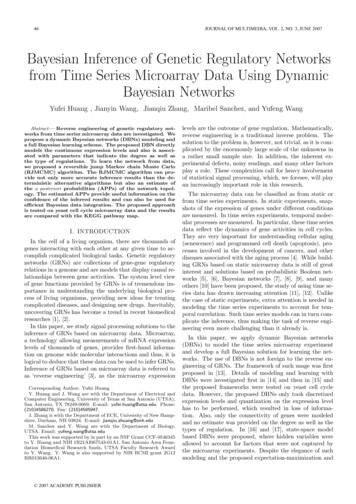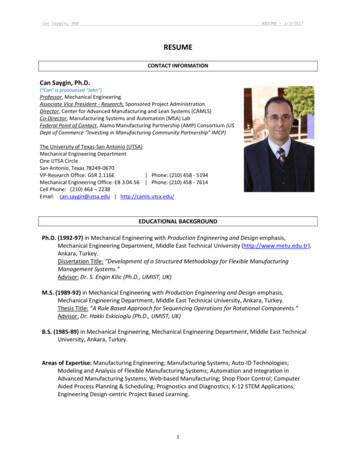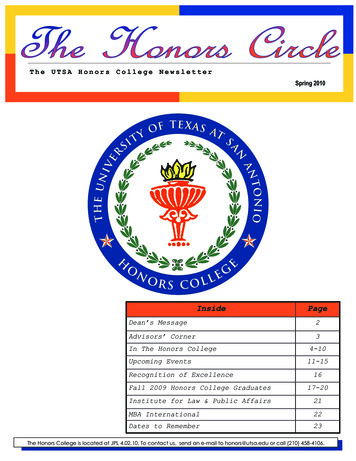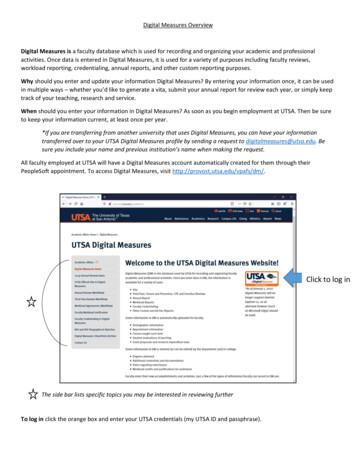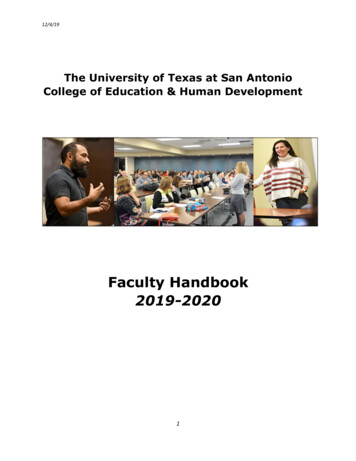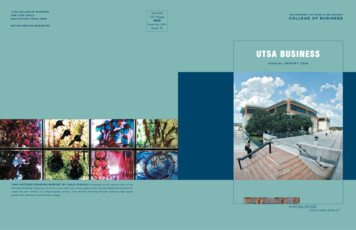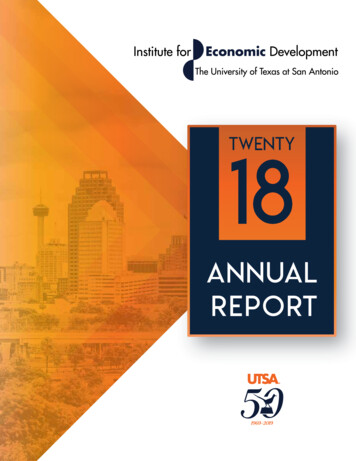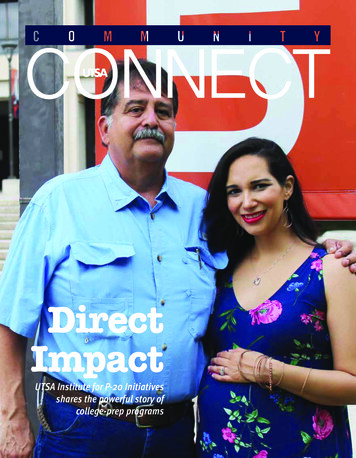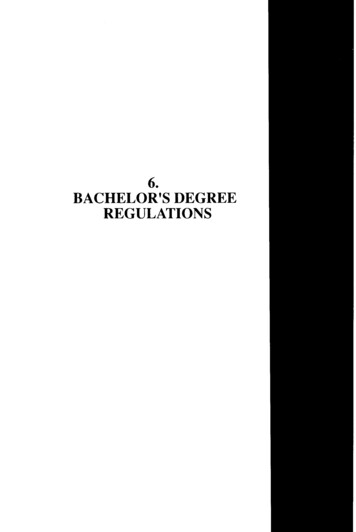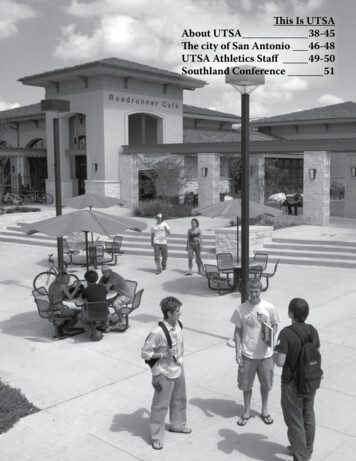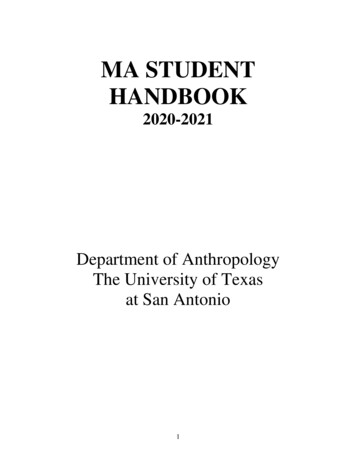
Transcription
MA STUDENTHANDBOOK2020-2021Department of AnthropologyThe University of Texasat San Antonio1
NOTE: Information contained herein may be date sensitive. It is the student’sresponsibility to ensure that the material is current and applicable to her/hisprogram of study. The information should be considered a supplement to theappropriate Graduate Catalog and deadlines and information found on theGraduate School’s website: http://graduateschool.utsa.edu/For questions, please contact the MA Graduate Advisor of Record (GAR),Dr. M Kathryn Brown (kathryn.brown@utsa.edu)2
TABLE OF CONTENTSI.Department of AnthropologyII. Organization and Administration of the Master’s ProgramIII. Anthropology Faculty and StaffIV. MA at a GlanceV. Admission to the ProgramVI. Master's Degree RegulationsVII. Transfer of CreditVIII. Annual Review of StudentsIX. Selected Academic RegulationsX. Comprehensive ExamsXI. Master's ThesisXII. GraduationXIII. Department Funding Opportunities for MA StudentsXIV. Graduate Student OrganizationsXV. Additional Resources for Anthropology Graduate StudentsXVI. Forms, Forms, Forms344589912131416182021242425
I.DEPARTMENT OF ANTHROPOLOGYAnthropology pursues an understanding of the cultural determinants of human behavior. This is accomplishedthrough comparative analysis of past and present social systems; cross-cultural assessment of bio-culturalinteractions; and, systematic comparison with nonhuman primate social and ecological adaptations. Anthropologyis inherently multicultural in approach and global in scale. As a result, the discipline is typically conceptualized asconsisting of four concentrations: cultural anthropology, archaeology, biological (physical) anthropology, andlinguistic anthropology. UTSA’s undergraduate anthropology program offers students a thorough grounding in eachof these concentrations. The graduate program provides more specialized, professional-level preparation: ourMaster’s students receive advanced sub-disciplinary training, while our Ph.D. students focus upon anthropology’shistorically rich and theoretically varied engagement with environmental issues.Anthropology at UTSA emphasizes a four-field approach to Master’s level training in anthropology. Theoreticaland applied emphases include political and cultural ecology; landscape perspectives; agrarian economy andecology; the archaeology of complex societies; indigenous and environmental politics; primate and evolutionaryecology; medical anthropology; perspectives on sociocultural change; myth, ritual and language; and conservationpolicy and practice. Geographical research areas include: American Southwest, Texas, Northwest Mexico, MayaLowlands, and Andean South America (archaeology); Southeast Asia, East Africa, and Neotropics (biologicalanthropology); United States, Mexico, US-Mexico borderlands, Caribbean, Central America, Lowland SouthAmerica, and Island Pacific (cultural anthropology).The Master of Arts degree in Anthropology at UTSA was formally authorized in 1980 by the UT SystemCoordinating Board. However, graduate-level courses in archaeology had been offered since the opening of theUniversity in 1973. The 1980 authorization created Master’s program specializations in both archaeology andethnohistory. A specialization in cultural anthropology was added in the Fall of 1993. Biological anthropology wasadded with the addition of faculty in the subfield. For more information visit the departmental homepage at:http://colfa.utsa.edu/ant/II.ORGANIZATION AND ADMINISTRATION OF THE MASTER’S PROGRAMThe MA Graduate Program Committee (MA GPC) administers the Master’s program in the Department ofAnthropology within the College of Liberal and Fine Arts. The committee is constituted according to department,college, and university (Graduate Council) bylaws:A Graduate Program Committee will be established for each graduate degree program. The Committee shallconsist of all Members who conduct research pertaining to the disciplinary area and/or who teach in theprogram. The Graduate Program Committee may elect Special Members of the Graduate Faculty toparticipate. Each Graduate Program Committee shall elect its own Chairperson for a term defined by thebylaws of the appropriate academic unit. A Graduate Program Committee may choose to form an executivecommittee to facilitate its operations.The MA GPC recommends admission of students into the program and oversees the implementation of degreerequirements. This committee formulates academic policy, guidelines, and curricula.The Department Chair appoints the Graduate Advisor of Record for the MA program (MA GAR) for a three-yearterm in accordance with department, college, and university (Graduate Council) bylaws. The MA GAR will handlemost day-to-day operations of the program, advise all Master’s students, maintain records, and represent theDepartment in most matters relating to Master’s students. The monitoring of a student’s progress through the programwill also be the responsibility of the MA GAR, along with the chair of the student’s comprehensive exam and thesiscommittees and the MA GPC. Questions about degree requirements and academic policies will be directed to theGAR, but final authority for the MA Program rests with the Office of the Dean of the Graduate School.4
III.ANTHROPOLOGY FACULTY AND STAFFA. Administrative Faculty and StaffChair: Dr. Thad Bartlett (thad.bartlett@utsa.edu)Administrative Assistants: Diana Lomas (diana.lomas@utsa.edu0MA Graduate Advisor of Record (MA GAR): Dr. M Kathryn Brown (kathryn.brown@utsa.edu)PhD Graduate Advisor of Record (PhD GAR): Dr. Jamon Halvaksz (jamon.halvaksz@utsa.edu)Graduate Council Representative: Dr. Michael Cepek (michael.cepek@utsa.edu)B. Graduate FacultyThad Q Bartlett (PhD Washington U 1999; Prof; Interim Department Chair); Biological anthropology,primate behavior and ecology, human origins; Thailand; thad.bartlett@utsa.eduM Kathryn Brown (PhD Southern Methodist U 2003; Lutcher Brown Endowed Prof); Archaeology,complex societies, warfare and conflict and ancient societies, ritual and religion; Mesoamerica, Texas;kathryn.brown@utsa.eduRebecca E Bria (PhD Vanderbilt U 2017 Asst Professor), Archaeology, complex societies, ritual andreligion, food production and consumption, historical ecology, communities, digital archaeology and GIS,collaborative archaeology, educational outreach; Peru, Andes; rebecca.bria@utsa.eduFernando A Campos (PhD U of Calgary 2014; Asst Prof); Primate behavioral ecology, health and disease,biodemography, life history evolution, climate change, conservation; Neotropics andAfrica; fernando.campos@utsa.eduMichael L Cepek (PhD U Chicago 2006; Assoc Prof); Sociocultural anthropology, indigenous andenvironmental politics, theories of practice/value/identity, science and conservation, oil industry, activism;Amazonia, Ecuador; michael.cepek@utsa.eduDevin Flaherty (PhD U California-Los Angeles 2019; Asst Professor); Medical anthropology,psychological anthropology, anthropology of care, anthropology of morality, phenomenology, aging/end oflife, narrative.; Caribbean, U.S. Virgin Islands, St. Croix.; devin.flaherty@utsa.eduK Jill Fleuriet (PhD Stanford U 2003; Assoc Prof; Honors College Associate Dean); Medicalanthropology, production of health inequalities in the United States, immigration, gender and health; USMexico borderlands; jill.fleuriet@utsa.eduPatrick M Gallagher (PhD Stanford 2015; Asst Prof); Sociocultural anthropology, environmentalanthropology, political ecology, environmental knowledge production, anthropology of science;Mesoamerica, the Caribbean, Belize; patrick.gallagher@utsa.eduJamon Alex Halvaksz (PhD U Minnesota 2005; Assoc Prof); Environmental anthropology, politics ofnature, mining and conservation areas, indigenous epistemologies and the sciences, agriculture; Papua NewGuinea, Pacific; jamon.halvaksz@utsa.eduMarcus J Hamilton (PhD U New Mexico 2008; Assoc Prof); Archaeology/Biological Anthropology,5
hunter-gatherers, paleoindians, sociopolitical and economic complexity, biocultural diversity, evolutionaryecology, complexity science, macroecology, biogeography; US SW and Southern Plains;marcus.hamilton@utsa.eduRobert J Hard (PhD U New Mexico 1986; Prof); Archaeology, early agriculture, hunter-gatherers,method and theory, stable isotope ecology, ethnoarchaeology, cultural ecology; Northern Mexico,American SW, Texas; robert.hard@utsa.eduLaura J Levi (PhD U Arizona 1993; Assoc Prof); Archaeology, landscape production, householdorganization, agrarian economy, culture theory, complex societies; Mesoamerica, US SW;laura.levi@utsa.eduLuca Pozzi (PhD New York U 2013; Asst Prof); Biological anthropology, primate biodiversity, evolutionand conservation, systematic biology and phylogenetics, population genetics, biogeography; Africa andMadagascar; luca.pozzi@utsa.eduEva C Wikberg (PhD U Calgary 2012; Asst Prof); Biological anthropology, primate conservation,behavioral ecology, gut microbiome, social structure, genetic structure, Ghana and CostaRica; eva.wikberg@utsa.eduJason Yaeger (PhD U Pennsylvania 2000; UTSA President’s Endowed Prof; Associate Dean, COLFA);Archaeology, complex societies, identity, households and communities, landscapes, theory and method,ethnohistory; Mesoamerica, Andes; jason.yaeger@utsa.eduB. Senior LecturerDeborah Wagner (MA U Texas-San Antonio 2008; Lecturer) Cultural anthropology, cross-cultural studyof ritual, place and space; deborah.wagner@utsa.eduC. ResearchersRaymond P Mauldin (PhD U New Mexico 1995; Interim Director, Center for Archaeological Research);Hunter-gatherers, early agricultural transition, quantitative analysis; Texas, American SW;raymond.mauldin@utsa.eduD. Anthropologists in Other Department, School or InstituteAnne Hardgrove (PhD U Michigan 1999; Assoc Prof, History); Modern South Asia, Asian-Americanstudies, migration and globalization, comparative colonialism, gender studies, cartography, visual practices,public history; anne.hardgrove@utsa.eduCorey Shepard Sparks (PhD Pennsylvania St U 2007; Assoc Prof, Demography); Child health, spatialanalysis, social inequality, statistical methods; corey.sparks@utsa.eduEric Shattuck (PhD, Indiana University, 2015); Biological anthropology, hormones, health and behavior,behavioral endrocrinology, ecoimmunology, psychoneuroimmunology; eric.shattuck@utsa.eduArmando L Trujillo (PhD U Texas-Austin 1993; Assoc Prof, Bicultural- Bilingual Std); Anthropology ofeducation, anthropology of development, ethnicity, bilingualism, biculturalism; US SW, Mexico;armando.trujillo@utsa.eduF. Research Associate6
Bernadette Cap (PhD U Wisconsin-Madison 2015; Res Assoc); Archaeology, complex societies,economic organization, remote sensing, archaeological chemistry; Mesoamerica; bernadette.cap@utsa.eduDonald V Kurtz (PhD U California-Davis 1970; Res Assoc); Political anthropology, anthropologicaltheory, cultural analysis, social organization; Mesoamerica, South Asia; d.v.k@anvilcom.comJon C Lohse (PhD U Texas-Austin 2001; Res Assoc); ancient Maya political and social organization;environmental archaeology; U.S. Plains, Texas; Mesoamerica; jonclohse@gmail.comJames H McDonald (PhD Arizona St U 1991; Prof; Dean Humanities & Social Sciences, Southern UtahU); Political and economic anthropology, political economy, agricultural development, appliedanthropology, sociocultural change, organizational culture; Mexico, Latin America, US;james.mcdonald@suu.eduMolly Morgan (PhD Vanderbilt U 2010; Res Assoc); Mesoamerican Preclassic, household archaeology,environmental archaeology; Mesoamerica; mollymorganlohse@gmail.comRobin A. Robertson (PhD Harvard U 1980; Res Assoc); Maya civilization ceramic analysis;Mesoamerica; rrobertson818@gmail.comKaren E Stothert (PhD Yale U 1974; Res Assoc); Archaeology, culture and technology; Ecuador, LatinAmericaG. Emeriti FacultyCarolyn L Ehardt (PhD U Texas-Austin 1980; Prof Emerita); Biological anthropology, primatebehavior/ecology/conservation, epidemiology and ecology of tropical diseases; Africa, Neotropics;carolyn.ehardt@utsa.eduDaniel J Gelo (PhD Rutgers U 1986; Prof Emeritus); Symbolic anthropology, religion, social organization,language and culture, ethnomusicology, folklore, history of anthropology, visual anthropology; NorthAmerica; daniel.gelo@utsa.eduMaría Luísa Urdaneta (PhD Southern Methodist U 1977; Prof Emerita); Medical anthropology, urbanand applied anthropology, Mexican Americans, gender studies, folk healing, health care and nursing; USSouthwest, Latin America; mlurdaneta@aol.com7
IV.MA AT A GLANCE1) You are admitted and assigned an advisor.Admission: You are admitted either unconditionally, conditionally, or on academic probation withconditions. See this packet and the Graduate Catalog for what each classification means to an individualgraduate program of study.Advisor: Your advisor upon admission is the faculty member who has agreed to serve as your academicadvisor. This may not be the person you ultimately end up having as your thesis advisor. The academicadvisor helps the student plan their program of study (see 2 below). Your thesis advisor will help youdevelop your committees for the thesis proposal and the thesis (this should ideally be the same set ofpeople), and guide the student in their thesis proposal preparation and thesis. Meet regularly and often withyour advisor. Office hours are best.2) You complete your “program of study,” which includes coursework, comprehensive exams, and, mostoften, a thesis.Coursework: All students take 3 theory courses, 1 methods course, and 5 elective courses. Of theelectives, only 6 hours, total, may be internships and independent studies. If you were admitted withconditions, you may have to take other coursework, as well. As you take courses, you develop professionalrelationships with faculty that may be on your thesis proposal and thesis committees. Start thinking aboutcommittee composition and thesis topics (see below) NOW.After you successfully meet your conditions, you MUST meet with the GAR with documentedevidence so that the Removal of Conditions form is submitted. If you do not submit the form and havethe conditions removed, you cannot graduate.Comprehensive Exams: After you finish the required theory and methods courses, you are eligible tobegin taking your comprehensive exams. See Procedural Statement for Comprehensive Exams in thispacket for detailed information on the process.Thesis: After you complete all course requirements and pass your comprehensive exams, you can enroll inthesis hours. See Master’s Degree Regulations in this packet or the Graduate Catalog for moreinformation). See the Procedural Statement for the Thesis in this packet for detailed information on theprocess.You have six years to finish your degree. Should more time be necessary, students must petition the facultyin order to receive an extension. See the Graduate Catalog and/or the MA GAR for more details.Annual Review of Students. Every spring semester, you will conduct a self-assessment of your progressthrough the program. You will discuss the assessment and your progress with your advisor. Then, thefaculty as a whole will meet to discuss your progress through the program and notify you of theirassessment. (see Policy Statement on Annual Review of Students included in this packet for detailedinformation.)3) You graduate! Once you have successfully completed all program requirements (and any admission conditions)in a timely fashion and are in good academic standing, you are ready to graduate. Be sure to apply forgraduation by the deadline in the semester in which you expect to graduate. If you do not graduate, e.g. youdo not finish your thesis, you must re-apply for graduation the next semester.8
ADMISSION TO THE PROGRAMV.ADMISSION CLASSIFICATIONSGraduate Degree-SeekingA graduate degree-seeking student is one admitted to a graduate degree program. Admission as a graduate degree-seekingstudent may be unconditional, conditional, or conditional on academic probation.Unconditional AdmissionAn applicant who has met the University-wide admission criteria and admitted unconditionally upon recommendation of theGraduate Program Committee and approval by the Dean of the Graduate School.Conditional AdmissionAn applicant who has insufficient preparation in his or her intended graduate degree program, or who lacks certain supportingdocumentation required for unconditional admission, may be admitted conditionally upon recommendation of the GraduateProgram Committee and approval by the Dean of the Graduate School.Notification of condition(s) along with time limitations imposed by the Graduate Program Committee will be included in thenotification of admission. If student does not adhere to the conditions, he or she will be automatically dismissed from theUniversity. The dismissal cannot be petitioned by the department.Conditional Admission on Academic ProbationAn applicant who has insufficient preparation in his or her intended graduate degree program and does not meet the criteriafor conditional admission basis may be admitted on academic probation upon recommendation of the appropriate GraduateProgram Committee and approval by the Dean of the Graduate School. Such admission requires that coursework taken duringthe first semester be completed with a grade point average of “B” (3.0 on a 4.0 scale) or better. Failure to earn this average willresult in academic dismissal. The dismissal cannot be petitioned by the department.MASTER’S DEGREE REGULATIONSVI.This follows the 2019 – 2021 Catalog. If you were admitted under a different catalog, be sure to follow thatcatalog.University-wide RequirementsIn order to receive a master’s degree from UTSA, the following minimum requirements must be met:1.2.The student must be admitted as a graduate degree-seeking student for the degree sought.The student must complete the minimum number of semester credit hours required for the degree. All master’sdegrees require a minimum of 30 semester credit hours.3. The student must remove all conditions of admission, if any were assigned at the time of admission.4. Subject to the six-year time limitation, the student must satisfactorily complete all coursework as specified in his orher discipline’s program of study, and, if Option I is selected, must satisfactorily complete the thesis as outlined in theOptions for Master’s Degrees section of this chapter.5. The student must formally apply for the degree in the Office of the Registrar no later than the deadline for thesemester in which he or she intends to graduate (for deadlines, see the online registration calendar).6. The student must satisfactorily complete the comprehensive examination, except as provided by the M.B.A. degreeand Master of Accountancy, M.S. Business, M.S. Data Analytics, M.S. Information Technology and Master of SocialWork.7. The student must meet the grade point average requirement of 3.0 or higher (on a 4.0 scale) in all work counted as partof the degree program.8. No courses in which grades of less than “C” (below 2.0 on a 4.0 scale) were earned may be applied to a graduatedegree, nor may courses for which the grade of “CR” was earned by examination be applied to minimum degreerequirements. Credit for selected internships and practica in which a grade of “CR” was earned may be applied tominimum degree requirements upon approval of the Graduate Program Committee.9. To graduate, all graduate students must have an overall grade point average of at least a 3.0 (on a 4.0 scale).10. The majority of graduate coursework for a master’s program must be completed at UTSA.9
Comprehensive ExaminationA candidate for a thesis master’s degree must, in addition to other requirements, pass (according to department standards) thecomprehensive examination, which may be oral, written, or both. Students must be registered during any semester or term inwhich they are taking required examinations. If registered for no other courses, students must be enrolled in 6961,Comprehensive Examination.Comprehensive examinations are given only to those students who have complied with the following requirements:1.2.3.4.5.6.Completion of all conditions of admission, if any were assigned at the time of admission.Completion of all special admission requirements for the degree program, if any.Be in good academic standing.Have an acceptable program of study in the discipline in which the degree is sought.If a thesis is to be written, selection of supervising professor and thesis committee and acceptance of thesis topic.Enrollment in 6961, Comprehensive Examination, in the semester the comprehensive examination is taken, ifregistered for no other courses that semester.Supervising CommitteeEach comprehensive examination is developed, administered, and scored under the guidance of a supervising committee withtwo or more members, one of whom is designated as chair. The chair must be a member of the Graduate Faculty in the majorarea of study.In general, all committee members must be members of the Graduate Faculty in the major area of study. Occasionally, scholarswho hold nontenured or tenure-track faculty appointments at the University, such as research professors or adjunct facultymembers, or off--campus scholars, are appointed because their expertise would be valuable to the student. The composition ofthe committee is subject to approval by the Dean of the Graduate School.The supervising committee is responsible for the quality, depth, and balance of the comprehensive examination.Anthropology offers a Thesis Option only for Master’s DegreesThesis OptionThe candidate for a master’s degree must complete the required number of semester credit hours in coursework approved bythe appropriate Graduate Program Committee, including 6 semester credit hours for a thesis. The thesis is subject to approvalby the student’s program advisor, Thesis Committee, graduate advisor, and the Dean of the Graduate School.No more than 6 semester credit hours of thesis can be applied toward a master’s degree.Students receiving advice and assistance from a faculty member in the preparation of a thesis must enroll in the appropriatethesis course (if necessary, for multiple semesters) until final submission is approved by the Dean of the Graduate School.Requirements for Thesis.The following steps for completing a thesis as part of a master’s degree are the responsibility of each degree candidate:1.2.3.Secure the approval of the supervising professor, who is also Chair of the Thesis Committee. Upon recommendationof the Graduate Program Committee and the academic College, the Graduate School appoints the ThesisCommittee. The Thesis Committee consists of the Thesis Chair and two additional members of the Graduate Faculty.The chair of the Thesis Committee must be a member of the Graduate Faculty for that graduate program. A majorityof the thesis committee must consist of graduate faculty or adjoint faculty in the student's program. Changes to theThesis Committee require documentation to be signed by the Department Chair, the Associate Dean of the College,and the Dean of the Graduate School and must be received by the Graduate School. The student is expected to workclosely with the Thesis Chair in selecting the thesis topic and in completing other details of their study.Submit a preliminary draft for approval by the Thesis Chair no later than 45 calendar days before final examinationsof the semester in which the degree is to be awarded. The first draft should demonstrate the student’s understanding ofthe preparation guidelines; it is understood the text is still being modified.Secure approval of the draft by the Thesis Committee. This step is intended to ensure that the thesis meets the requiredstandards for content, expression, format, spelling, and accuracy. Candidates are responsible for meeting the standardsof those reading and approving the thesis.10
4.Submit the final copy of the thesis to the supervising professor and Thesis Committee no later than 20 calendar daysbefore final examinations of the semester in which the degree is to be awarded. This copy of the thesis must be theoriginal and, if acceptable, must be signed by the Thesis Chair and members of the Thesis Committee.[NOTE: Student and Thesis Chair must complete the Certification of Completion of Thesis Requirements for Master’sDegree Form available from the graduate ds/Certification of Completion of Thesis Requirements For Masters Degree.pdf ]5.6.7.8.The format of the thesis must follow University regulations. The detailed requirements of thesis formatting guidelinesand deadlines are available on the Graduate School’s Web site at http://graduateschool.utsa.edu. The final submissionmust conform with both the Guide for the Preparation of a Master’s Thesis and Format Template at the time ofsubmission to the Graduate School.The final copy must be electronically submitted to ProQuest/UMI for both publishing and purchasing boundcopies. Copyright is optional and may be arranged by the student and will be at their expense.Copies of theses and dissertations are available to the general public through the UTSA Library and ProQuest/UMI.Acceptance of the thesis requires final approval from the Dean of the Graduate School.Limitation on Repeating Courses for CreditMany independent study, thesis, special problems, special topics, directed research, seminar, dissertation, and other similarcourses may be repeated for credit; however, limitations exist on the number of semester credit hours that may be appliedtoward a degree. Refer to the individual course descriptions for specific details on these limitations and consult the appropriategraduate advisor.Catalog of GraduationGraduate students have six years from the semester of original registration as degree-seeking to complete a graduate degreeprogram under the catalog in effect at the time of initial registration at UTSA, provided they are continuously enrolled atUTSA. If a student drops out for one or more long semester (Spring or Fall), they have the option of reenrolling under asubsequent catalog. These students will have six years to complete degree requirements under the new catalog. In the event thatcertain required courses are discontinued, substitutions may be authorized or required by the appropriate Graduate ProgramCommittee.Additional Master’s DegreesA student who holds a master’s or higher degree may pursue an additional master’s degree at UTSA only under the followingconditions:1.2.The additional master’s degree opens up an additional area, field, or concentration.The proposed second master’s degree is approved by the appropriate Graduate Program Committee, academic Deanand the Dean of the Graduate School.It should be further understood that:1.2.The same courses cannot be applied toward two different degrees.Credit applied to a previous degree at another institution which duplicates a portion of the program required under thesecond degree being sought at UTSA does not reduce the number of semester credit hours required for that seconddegree. (The only exception is the M.F.A. degree. See Courses Counted for Another Degree under Course Types andAcceptability in the Transfer of Credit section of this chapter.) Courses already taken would not be required. Rather,additional coursework would be substituted for previously completed courses.11
VII.TRANSFER OF CREDIT(From 2019-2021 Graduate Catalog)LimitationsQuantityStudents are expected to complete the majority of all coursework at UTSA. Transfer credit of usually not more than 6 semestercredit hours may be allowed for graduate coursework completed at another regionally accredited institution or with proof ofequivalent accreditation from a foreign institution. Exceptions require approval of the appropriate Graduate ProgramCommittee, academic College, and the Graduate School, and must meet conditions for transfer of credit. Work counted towarda degree at another institution cannot be transferred.Conditions for transfer of credit:Students must complete the form “Transfer of Graduate Credit towards Master’s Degree.”Student must be in a current master’s degree program.Student must be in good academic standing.The courses must have been completed with a grade of “B” (3.0) or better.Coursework must be from an accredited university and have not been used in another degree program.An official transcript from the institution where the coursework was completed must be submitted.All coursework must have been completed no more than six years before the degree was awarded.Coursework is subject to approval of the appropriate Graduate Program Committee and academic College in whichthe program is administered.9. Courses must be defined as graduate-level work at the institution where the credit was earned.10. International transcripts must be evaluated by a UTSA approved foreign credential evaluation service agency.1.2.3.4.5.6.7.8.Time LimitationAll requirements for a master’s degree must be completed within one six-year period. Work over six years old may bereinstated only with the permission of the Dean of the Graduate School, upon recommendation of the Graduate ProgramCommittee.Evaluation of CoursesThe student’s Graduate Advisor of Record and the College evaluate transcripts and designate which graduate courses areacceptable under the above provisions for transfer toward a master’s degree at UTSA. Whether or not a course is transferableas graduate coursework is determined by the course number assigned by the institution awarding the credit. To be transferableto UTSA, courses must be defined as graduate courses at the institution where credit was earned. Courses that are defined asundergraduate upper-division by their course numbers, but that can be applied to a graduate degree at the institution awardingthe credit, are not accepted for transfer toward a master’s degree at UTSA. All work submitted for transfer c
5 III. ANTHROPOLOGY FACULTY AND STAFF A. Administrative Faculty and Staff Chair: Dr. Thad Bartlett (thad.bartlett@utsa.edu) Administrative Assistants: Diana Lomas (diana.lomas@utsa.edu0 MA Graduate Advisor of Record (MA GAR): Dr. M Kathryn Brown (kathryn.brown@utsa.edu) PhD Graduate Advisor of Record (PhD GAR): Dr. Jamon Halvaksz (jamon.halvaksz@utsa.edu)
